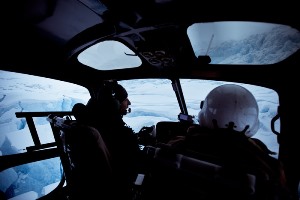‘Snowman’ director on crossing the ski-doc divide

Helicopter crashes, explosions and avalanches may be the stuff of scripted features for most, but for those in the mountaineering community, they are real life.
It was the unfortunate combination of all three that inspired former professional skier turned producer-director Mike Douglas to turn the focus of his production company Switchback Entertainment inward and tell the story behind the near-fatal accident suffered by his best friend, Kevin Fogolin, in 2009.
As a high-profile athlete, Douglas has starred in a long list of ski videos, often 30-minute showcases of professional ski prowess sponsored by snow-industry brands such as Salomon or Rossignol.
But Snowman, which closed the Whistler Film Festival on Sunday and took home the Best Mountain Culture prize, was a different endeavor. Building his film on a $400,000 budget, Douglas needed financing partners to make it possible. But what he didn’t want was to have brand logos leading his film’s opening credits, the treatment snow-industry brands are accustomed to.
In a festival panel about alternative financing partners for documentaries, Douglas explained why he wanted to break free from the traditional strategy his company uses to make the ski films they are known for in pursuing Snowman.
“It’s a personal story and I wanted to tell it in the purest sense I could,” Douglas said, noting that he wanted the film to work the festival route and that “your cred is wrecked with logos all over it.”
Switchback approached Douglas’ former sponsor Salomon, which was interested in funding the project until Douglas dropped his no-logo policy on them, deciding instead to provide equipment support. GoPro, which has a huge presence in the action sports industry, flat-out refused.
So Douglas turned to another personal-professional connection: Whistler Blackcomb, one of the world’s largest mountain resorts and for which he’s been a spokesperson and “team athlete” for years.
It was an unconventional pitch, admits Michelle Leroux, the head of Whistler Blackcomb PR, whom Douglas approached with his idea. The mountain typically works with ski, snowboard or mountain bike filmmakers that can showcase the mountain’s best assets, committing anywhere from up to $50,000 for a more serious ski film to $10,000-$12,000 for webisode content.
Douglas, however, not only came to Whister Blackcomb with a film about near-death in the mountains, he came at the end of the corporation’s fiscal year, limiting the resources Leroux could commit. But Leroux, who recalled the pitch for the panel, was intrigued.
“I’m a PR person and I want it to look like editorial,” she said. “I don’t want logos all over it. You’re portraying the community in a really positive way and the endemic community [e.g. a mountain audience] knows you’re one of our athletes.”
“What we need is support,” Douglas says he told Leroux. “We need to re-enact this helicopter crash. I know you guys have these systems in place. We need these things. We could pay out of our own pockets but you guys have these things.”
The two struck a deal that would see Whistler Blackcomb commit resources to make Douglas’ desire to recreate the avalanche scene possible, waiving the location fee and committing staff and resources to assist in the formidable task of recreating an unpredictable force of nature.
Switchback also launched a Kickstarter campaign to raise funds toward music rights for the film, raising $51,000 through the crowdfunding site.
Leroux noted, however, that Whistler was able to bring more non-financial resources to the film as it moved through production, its Kickstarter run and finally its big-screen festival debut, and she encouraged doc makers in the audience to take it into consideration when pursuing brands as partners.
“We have a huge email list and great social channels,” she said. “Mike is a legend in the ski community, so our audience really knows him. If you can activate with a brand in a way that resonates with their audience, they can help promote the film, getting people to the world premiere, to the Kickstarter and to see or share the film.”
In an interview following the panel, Douglas noted that although mountain culture aficionados are Snowman‘s primary target – right now, the trailer is being promoted through Salomon’s YouTube channel and via Whistler – he and his team sought to make a film with wider appeal with a 2015 run on the festival circuit.
“We tried to make a mountain film that will appeal to people that aren’t mountain people. The underlying themes of the film are quite universal – dreams and chasing things down, and how much risk are you willing to take in your life?” he explained.
He said he also hopes Snowman will help demonstrate that Switchback is more than just a ski-film production company.
“That’s was part of the reason we made such a push to go after the mainstream.”
– Image from Kickstarter

 The definitive CDN broadcast and production resource.
The definitive CDN broadcast and production resource.










